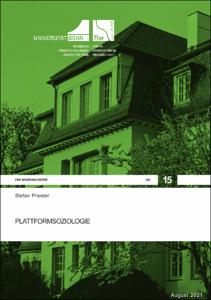Priester, Stefan: Plattformsoziologie. Bonn: Forum Internationale Wissenschaft, 2021. In: FIW Working Paper, 15.
Online-Ausgabe in bonndoc: https://hdl.handle.net/20.500.11811/9711
Online-Ausgabe in bonndoc: https://hdl.handle.net/20.500.11811/9711
@techreport{handle:20.500.11811/9711,
author = {{Stefan Priester}},
title = {Plattformsoziologie},
publisher = {Forum Internationale Wissenschaft},
year = 2021,
month = aug,
series = {FIW Working Paper},
volume = 15,
note = {Numerous contributions, especially in the field of Platform Studies, show the growing societal relevance of digital platforms and their role in the digital transformation of society. Meanwhile, sociological descriptions of the digital present are still dominated by concepts that have been formulated in analog times. But as the example of digital platforms shows, the digital transformation of society cannot be fully grasped by describing it as a process of digitization of the pre-digital. The paper begins by describing how the field of Digital Humanities first treated digital technologies as mere tools for empirical research within the epistemological frameworks of the established Humanities. Within this context digital technologies merit methodological consideration, but do not require any further theoretical reflections (1). In contrast to the Digital Humanities, the field of Software Theory no longer treats digital technology as a tool, but as an object of inquiry in its own right. Drawing on the work of Frabetti I argue that the distinction of sense (Sinn) and software depends on its theoretical context. Thus, the interrelation of sense and software is not a given, but is a consequence of the theoretical model that is used (2). Based on this assumption I ask, how the digitization of modern society can be interpreted within the framework of Luhmann’s theory of world society. Here, I come to the conclusion that the digitization of world society does not constitute a fundamental shift away from functional differentiation as the primary form of societal differentiation. Instead it can be described as an evolution in the operative realization of functional differentiation (3). The fourth part describes how Platform Studies analyzes how digital platforms modify the reproduction of functional subsystems such as Science or Economy (4). In the conclusion I argue with reference to Stichweh that digital platforms should be analyzed as a new “Eigenstructure“ of world society. Its differentia specifica consists in defying a strict distinction between social and technical systems by processing the reproduction of communication by means of software (5).},
url = {https://hdl.handle.net/20.500.11811/9711}
}
author = {{Stefan Priester}},
title = {Plattformsoziologie},
publisher = {Forum Internationale Wissenschaft},
year = 2021,
month = aug,
series = {FIW Working Paper},
volume = 15,
note = {Numerous contributions, especially in the field of Platform Studies, show the growing societal relevance of digital platforms and their role in the digital transformation of society. Meanwhile, sociological descriptions of the digital present are still dominated by concepts that have been formulated in analog times. But as the example of digital platforms shows, the digital transformation of society cannot be fully grasped by describing it as a process of digitization of the pre-digital. The paper begins by describing how the field of Digital Humanities first treated digital technologies as mere tools for empirical research within the epistemological frameworks of the established Humanities. Within this context digital technologies merit methodological consideration, but do not require any further theoretical reflections (1). In contrast to the Digital Humanities, the field of Software Theory no longer treats digital technology as a tool, but as an object of inquiry in its own right. Drawing on the work of Frabetti I argue that the distinction of sense (Sinn) and software depends on its theoretical context. Thus, the interrelation of sense and software is not a given, but is a consequence of the theoretical model that is used (2). Based on this assumption I ask, how the digitization of modern society can be interpreted within the framework of Luhmann’s theory of world society. Here, I come to the conclusion that the digitization of world society does not constitute a fundamental shift away from functional differentiation as the primary form of societal differentiation. Instead it can be described as an evolution in the operative realization of functional differentiation (3). The fourth part describes how Platform Studies analyzes how digital platforms modify the reproduction of functional subsystems such as Science or Economy (4). In the conclusion I argue with reference to Stichweh that digital platforms should be analyzed as a new “Eigenstructure“ of world society. Its differentia specifica consists in defying a strict distinction between social and technical systems by processing the reproduction of communication by means of software (5).},
url = {https://hdl.handle.net/20.500.11811/9711}
}






